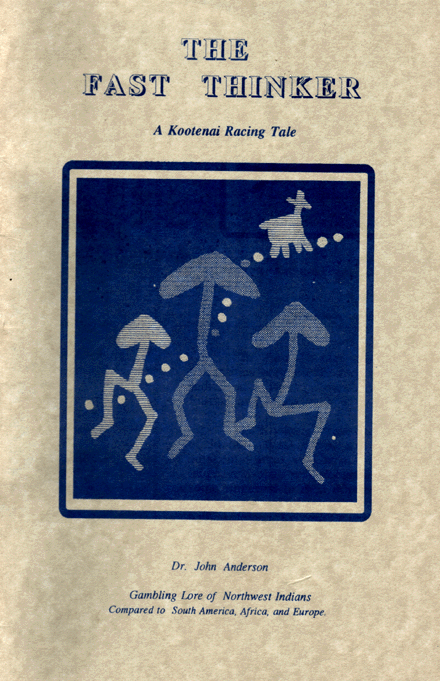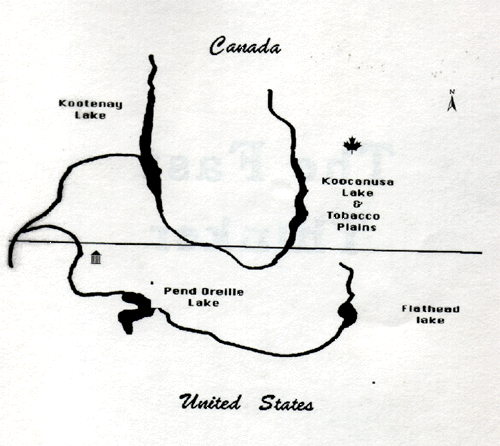ABOUT GAMBLING
A BOOK BY DR. JOHN M. ANDERSON
"Dr Anderson writes about Native American mythology. In this text, he examines the reverence in which the Frog is held as a clever thinker. Racing tales from four continents are compared to a humorous Kootenai Indian narrative of a legendary race which took place along the Canadian/American border. The Frog outsmarts the physically superior Antelope in this contest, reaping the rewards of group cooperation." (from the introduction)

In the Kootenai narrative, Antelope proves to be very arrogant about his wonderful running ability. He boasted to Frog one day about his superiority to all other animals, making Frog angry. So Frog, who was quite smart, decided to trick Antelope in a race. Antelope took up his challenge to a race, and bet heavily on his winning. But the clever frog hid his relatives in the weeds of the creek bed, and they jumped in sequence just in front of the speedy Antelope. Since each frog only had to jump once, they never got tired. But the foolish Antelope became exhausted and was beaten to the finish line. The Frog leader told Antelope when he expressed amazement at Frog's speed, that he was not such a fast runner but he was decidedly a fast thinker.
Similar stories can be found all over the world. A number are featured in the chapters and appendices of this little book, including remarkably similar stories from South American, South Carolina, Africa, and Europe. In each of these tales, a slow moving animal is the 'fast thinker' and a very speedy animal is the foolish loser. These actors in the plot include the Frog, Turtle, Hedgehog as slow runners and the Antelope, Deer, and Rabbit as speedy runners. Again and again, the stories end with the same moral teaching against arrogance, especially when the arrogant person fails to respect intelligence.
The Ethics of Gambling and Racing
"... carefully examine these racing stories. Read them out loud if you can, and pay special attention to the use of deception by the winners of the races. The similarities between the strategies of the Kootenai and Bantu Frogs is especially striking. What can we make of the common theme in these tales, a celebration of the use of trickery to overcome an adversary? Were the narrators less ethical in some way, compared to the average contemporary person? I don't think so.
In each story, you will notice that the audience is told that the loser was an arrogant person, deserving to be put in his place. But this is not the only information needed to understand these 'cheating tales.' The whole context of risk-taking in gambling needs to be examined." (page 26)
"The Kootenai Indians have demonstrated an amazing resilience in their struggles against landlessness, poverty, and tremendous pressures to assimilate into the mainstream cultures of Canada and America. Some have chosen integration, moving away to jobs in distant towns. That many have not taken this path, enriches us all. They have kept alive a cultural identity which is priceless. The preservation of tales, like the Fast Thinker with its encouragement of group cohesion, has played an important role in keeping the Kootenai together. Only when led by wise thinkers, unhurried in their judgment and disinterested in personal vanity, are the Kootenai best prepared for the future. All of us can learn from such teachings." (page 27)
This simple map at left appears on page 2 of the text. It shows Koocanusa Lake and Tobacco Plains on the middle right. The Kootenay river flows west into the Kootenay lake in Canada (British Columbia). Below is Lake Pend Oreille, where the Kootenay often visited for trading and social contacts with the Kalispel and other Salish peoples. Upriver is the Flathead lake, where the Flathead Reservation is located in Montana. Both Kootenai and Kalispel live on the Flathead Reservation.
Koocanusa Lake "An American name for the long lake, situated in the middle of the Tobacco Plains. This lake is divided by the Canadian/American border. Koocanusa is a construct: Koo (Kootenai), -Can (Canada) and USA (United States of America)"(from the glossary, page 39).
through the John M. Anderson Library Project.
MORE TEXT from this book

Kootenai: Upper "A major subdivision of the Kootenai tribe. Tobacco Plains (located in both Canada and America) was the ancient population center of these Kootenai" (from the glossary, page 40).
Kootenai Indians
The Swordfish Race (Calif. myth)
The Fox Jumps (Salish myth)